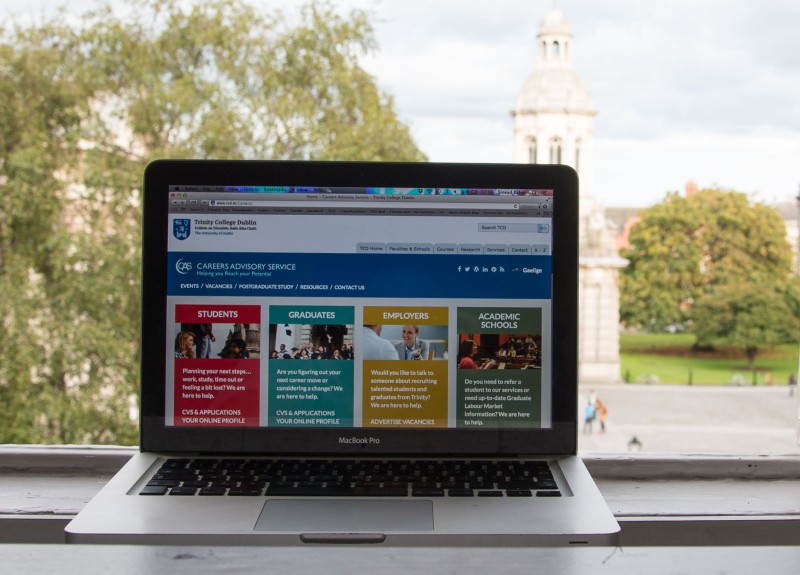Trinity needs to appoint a new Chief Digital Officer at executive level to lead the College’s strategy on technology, according to an external quality review of IT Services that also recommended a raft of other changes to the division.
The review, presented to the College Board in December and seen by The University Times, found that in Trinity, “processes and governance for the introduction of new Technologies, Services and Applications are lacking”, and recommended that “IT Services Governance needs to be broadened to include all Faculties and Departments”.
The Chief Digital Officer should “own, scope and lead the digital strategy at a senior level for Trinity”, according to the review, and must be “placed outside of IT”.
The report also highlighted the lack of standardisation when it comes to IT equipment, something the reviewers said has resulted in a “proliferation” of technology systems and support services across campus.
The review found that IT Services provides audio-visual support to just one third of meeting rooms on campus. It said that “there is a frustration with the lack of standardisation” and pointed out that students and staff “have wide ranging and often unsatisfactory experiences in these teaching areas as a result”.
Speaking to The University Times, Patrick Magee, the director of IT Services, said that the department provides technical support to “the Senior Lecturer Pool teaching and learning rooms” and explained that this “an historic thing that’s been in place in Trinity for a long time”.
Magee said that IT Services are in discussions with the College bursar Veronica Campbell and the director of campus infrastructure Mike Clark about remedying this. “From our point of view, it frustrates us that if someone walks into a room and has a bad experience that thinks, ‘the AV isn’t working, call the IT Services’. But we’re not allowed to go into that room. We actually can’t go in there and help.”
“We are frustrated because people associate us with all the technology in the College and when we’re not responsible for it, it doesn’t work for either side”, he said.
The review, which will return to Board in the coming months, also found that the budget allocated to IT Services “is significantly misaligned to industry benchmarks”. It found that there was no provision for the costs associated with purchasing new systems.
Magee said that the budgetary issues are partially the result of the lack of funding for higher education. “As the College has grown, we’ve been dealing with the deficit, so we haven’t had the money in the last number of years to grow the budget in IT Services in the way that the benchmarks would suggest”, he said.
He added that the department is facing increasingly high costs. The cost of providing network connectivity, for use both in the College’s academic and residential settings, is going up year on year as a result of inflation, according to Magee. “So where we probably before had a budget that had an amount for ‘business as usual’, what I call keeping the lights on, and a variable amount for us to do changes and improvements, those changes and improvements have been squeezed because our costs that we don’t control … are going up.”
On the proposal for a Chief Digital Officer, Magee said he thought the reviewers “were thinking more around a typical classical commercial organisation rather than a university. For us, it’s more of an evolution and so it’s a big statement, and it would be a powerful role for a university to have”.
He continued: “We want Trinity to do technology-enhanced learning and putting more digital apps in the hands of students and staff. But do we want to completely change Trinity? It’s typically in companies where you see Chief Digital Officers. That’s my opinion.”
The review also stated that a Chief Information Officer should be appointed “to provide oversight and strategic partnership across the entirety of the IT landscape at Trinity”.
Some 17 of the recommendations in the review were classed as high priority. A further 15 were medium priority, and another seven low priority.
Amongst the high priority recommendations is the proposal to standardise e-learning platforms across all faculties. The report said that the e-learning management systems, such as Blackboard and Canvas, “are perhaps the most widely used systems by everyone on campus … but they are not standardised and integrated, and feedback is that this is a frustration for staff and students”.
The report also said that ahead of acquiring any of new technologies, “the life-time cost of the new application must be defined and budgeted for”.
The review also recommended that a graduate programme be developed for IT Services. It is hoped that this will enable the College to create a pipeline of talent and skills at a relatively low cost. The review also recommended the recruitment of graduates “to refresh skills due to the significant average tenure of the current team”.
It suggested that all IT professionals should be located in a single building, to “improve team building and optimise capability, learning and skills development across teams”.
The report also highlighted the need for GDPR compliance. It instructed that awareness campaigns should be aimed at senior staff members. “Engage them and stress that a satisfactory level of security only will be obtained when proper behaviour is emphasised.”






